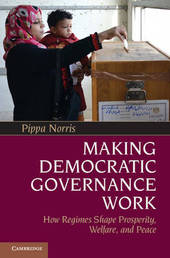
|
Making Democratic Governance Work: How Regimes Shape Prosperity, Welfare, and Peace
Paperback / softback
Main Details
| Title |
Making Democratic Governance Work: How Regimes Shape Prosperity, Welfare, and Peace
|
| Authors and Contributors |
By (author) Pippa Norris
|
| Physical Properties |
| Format:Paperback / softback | | Pages:294 | | Dimensions(mm): Height 234,Width 156 |
|
| ISBN/Barcode |
9781107602694
|
| Classifications | Dewey:321.8 |
|---|
| Audience | | Professional & Vocational | |
|---|
| Illustrations |
11 Tables, unspecified; 2 Maps; 23 Line drawings, unspecified
|
|
Publishing Details |
| Publisher |
Cambridge University Press
|
| Imprint |
Cambridge University Press
|
| Publication Date |
27 August 2012 |
| Publication Country |
United Kingdom
|
Description
Is democratic governance good for economic prosperity? Does it accelerate progress towards social welfare and human development? Does it generate a peace-dividend and reduce conflict at home? Within the international community, democracy and governance are widely advocated as intrinsically desirable goals. Nevertheless, alternative schools of thought dispute their consequences and the most effective strategy for achieving critical developmental objectives. This book argues that both liberal democracy and state capacity need to be strengthened to ensure effective development, within the constraints posed by structural conditions. Liberal democracy allows citizens to express their demands, hold public officials to account and rid themselves of ineffective leaders. Yet rising public demands that cannot be met by the state generate disillusionment with incumbent officeholders, the regime, or ultimately the promise of liberal democracy ideals. Thus governance capacity also plays a vital role in advancing human security, enabling states to respond effectively to citizen's demands.
Author Biography
Pippa Norris is the Paul F. McGuire Lecturer in Comparative Politics at Harvard University and an ARC Laureate Fellow and Professor of Government and International Relations at the University of Sydney. She is the author of a dozen related books published by Cambridge University Press, including Driving Democracy (2008) and Democratic Deficit (2011). Her contribution to the humanities and social science has been recognized most recently by the award of the 2011 Johan Skytte prize (with Ronald Inglehart) and the 2011 Kathleen Fitzpatrick Australian Laureate Fellowship.
Reviews"Political science has focused heavily on democratic institutions in recent years but far less on the understanding of basic state capacity, whose absence often undermines democracy. Making Democratic Governance Work is an important book that helps enormously to fill this critical gap in our understanding." - Francis Fukuyama, Olivier Nomellini Senior Fellow, Freeman Spogli Institute, Stanford University "This book is a landmark study of one of the most heated questions in social science: do political institutions determine human welfare, and if so, to what extent? The answer is a resounding, but qualified, 'yes.' Combining rigorous conceptual analysis with a wealth of data, Norris shows that liberal democracy is not enough for creating human well-being if states lack the capacity to implement policies. Her argument that international development organizations should promote both liberal democracy and the quality of government is both timely and convincing." - Bo Rothstein, August Roehss Chair in Political Science, University of Gothenburg "Pippa Norris has done it again. With masterful grasp of the literature and a breathtaking tour de force through vast masses of empirical data, she comes through with one simple and crystal clear conclusion: it's not a question of promoting democracy or building state capacity; it's a question of doing both. This book deserves to be read well beyond the boundaries of academia." - Jan Teorell, Professor of Political Science, Lund University
|